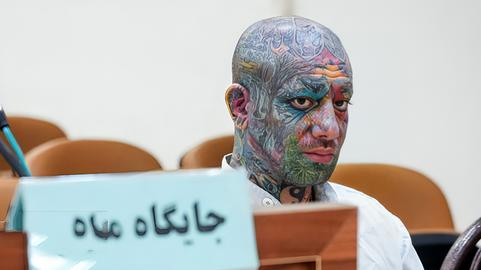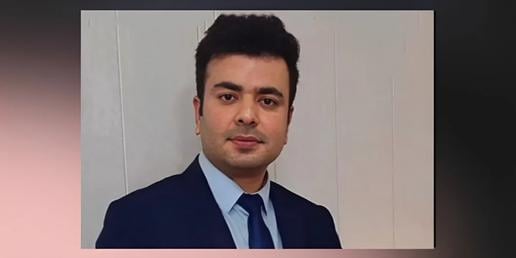
When Vahid was honest about his open relationship, friends constantly interrogated him: “You are not jealous? Have you no honor? Do you think this relationship is going anywhere?”
The relationship between Vahid and his wife is different from that of other couples. Both have sexual relationships with other people. They live in Iran, and started having an open relationship when Vahid was required to travel for a year during their engagement.
At first, they tried to endure the temporary separation and remain faithful to one another. But eventually, they decided that trying an open relationship was much better than cheating and lying about their commitment to each other. The engagement did not break up. On the contrary, Vahid claims their relationship improved. “We came to know ourselves and each other better,” he says, “from our sexual needs and abilities to emotional holes that were not filled through our relationship. After a while, we felt that we loved each other more.”
Their friends, however, considered the arrangement to be totally unacceptable. When they married, although they carried on their extramarital affairs, they kept it secret from friends. “We have no problems,” Vahid explains. “Going back to a two-person relationship is now unimaginable to us, but, because others are judgmental, we don’t even talk about it. For those around us, we were two unfeeling, irresponsible and promiscuous people who wanted to be with everybody on earth. So we decided to be silent.”
He emphasizes that their extramarital affairs are simply sexual and neither has a deep emotional relationship outside their marriage. “If you want the truth,” he says, ”a normal person does not have time to be in love with two people even if one wants to.”
One God, One Partner?
For people like Vahid, the motto “One God, One Partner” is both meaningless and impractical. For them, the idea that if a person is in love he or she won’t even think about a third person is totally nonsensical. Though most societies do not approve of sexual relationships that involve more than one partner and often regard such behavior as debauched and deceitful, for some young people who do not accept these rules, it is a way of life. For those who promote free love, commitment to only one person amounts to selfishness.
In an open relationship, two people agree to be with each other, but also allow relationships with others at the same time. The idea of sexual or emotional relationships with others is acceptable to both parties. Unlike a relationship that conforms to traditional rules, an open relationship is unlikely to end on grounds of what would normally be regarded as an act of infidelity.
It might be assumed that an open relationship is more compatible with Western and free societies. But recently it has become more acceptable for some young Iranians.
Maryam is in an open relationship. She now lives in Europe but her first experience was in Iran. She says the idea first appealed to her when she realized she wanted to be involved with women in addition to her relationship with her boyfriend.
Her boyfriend had no problems with this. “I thinks sexual relations between girls is attractive to boys,” she says, “or maybe he did not take the idea very seriously.”
Both partners are not always necessarily involved with other people but, usually, if only one partner wishes to pursue other sexual interests, the relationship will fail. Soon after expressing her interest in sleeping with women, Maryam discovered that she wanted to sleep with other men too. Though he could accept that Maryam might have relationships with girls, her boyfriend balked at the idea of her seeing other men. “In his view, this showed that I did not love him. Our relationship died eventually.”
After emigrating to Europe, she formed an open relationship with another man. “What is between us,” she says, “is not only sex. Many people like us live together, socialize together, are in love with each other and rely on each other. We all define what would break up our relationship differently.”
Maryam’s partner is Iranian but, after living in Europe for many years, he seemed to have an easier time accepting the rules of such a relationship. At least that was how Maryam saw it at first. “When it happened he was upset. Later he explained that he had no problem with one-night stands or short-term sexual relations, but he couldn't accept a parallel emotional relationship. But this is the way of life that I have chosen and, in the past two years, he has learned to live with it.”
Breaking Taboos
In the same way that in a conventional relationship having a coffee with a friend does not lead to a break-up, for Maryam and many people who have multiple partners, sex with others is not grounds for a split. For Maryam it is not important whether her sexual partner is married or not; nor is it important what happens between her partner and whomever else they might be seeing. “It’s none of my business!” she says.
“When people have a simple dinner with somebody,” she says, quoting a friend, “we do not question each other. We don’t ask: ‘was this your first time having dinner with someone other than your partner? Will we have dinner together again? Will you have dinner with somebody else?’” But, she adds, “these are the kinds of questions that are asked when you have sex with someone. This is a taboo that must be broken, or at least I think so.”
Maryam believes that an exclusive commitment is not only selfish, but it also takes the joy out of a relationship on both sides. “An open relationship gives me a better feeling of freedom. I fear the feeling of ownership that comes with an exclusive relationship.”
But, in these circumstances, how do you define honesty and sincerity? Individuals set their own rules and decide how much to share with their partners. “My only expectation is that my partner does not resort to weird lies and subterfuge to be with somebody else”, says Maryam. “But I don’t want to know the details. I don’t pry and I don’t lay traps.”
“Our mutual friends,” she reports, “believe that if they told me that my partner has been with someone else, jealousy would take over and our relationship would be over. But it hasn’t happened.”
Maryam admits that sometimes she has felt some jealousy or humiliation after learning that her partner has had sex with someone else. But she does not allow herself to express such feelings because she expects mutual respect between them. “The affection that we feel for each other should not let us limit one other.”
Most couples in an open relationship define their rules and red lines from the start. For many, sex with mutual friends or in the couple’s home or bed is a red line that, if crossed, can be seen as betrayal and bring an end to a relationship. Maryam and her partner did not set rules. When her partner was first upset by her having sex with someone else, they discussed it. As a result, Maryam does not reveal all aspects of her sexual encounters.
Polygamy: An Unequal Relationship
Open relationships, or “free love”, gained popularity in the 1960s and 1970s, particularly in North America and Western Europe. There is, however, a precedent for relationships that allow for sex between multiple partners: polygamy.
The practice of polygamy has a long history. It usually refers to a relationship in which men are allowed to have more than one wife; it is the man who holds all the power. In that respect, it differs a great deal from the concept of an open relationship. Even in the few societies where women are allowed multiple husbands, the men often decide to share their wife with another man, so women are not in a position of power. This lack of balance can even be observed in societies that have no legal barriers to open relationships and in which polygamy is illegal.
Polygamy is legal in Iran but the practice is for the most part frowned upon. Parviz, now aged 55 and the father of five children, entered into a polygamous relationship several years ago. When he was 18, his father pressured him to marry his cousin, who was four years older than him. When he was 47, he fell in love with a woman the same age as his eldest daughter. He was bitter about his forced early marriage, and he decided to marry his second wife using a false ID, without informing either women. The first wife found out and life was extremely difficult for everyone involved.
Now Parviz does not think about marrying again and is sorry for what he did. Perhaps, though, he is simply trying to avoid hassles and not necessarily the idea of having multiple partners. “These days,” he says, “any middle-aged man who has money can be with many young women. No need to marry.”
On the Other Side
Even though the idea of an open relationship is not an acceptable norm for most people, even in Western countries, the views of Mahtab S, who studied sociology and supports children’s and women’s rights, are particularly rigid. She believes that an open relationship completely goes against human nature. She is not even ready to call it a “relationship”. “In my view,” she says, “this is the same as a one-night exchange, meaning giving away your body in exchange for some kind of a reward. The reward does not have to be money; it might be affection for a night or the pleasure that it brings.”
“I am unable to understand it,” she says. “Maybe because of my nature as a woman. We women cannot have sex with somebody without attachment or at the very least an acceptance in our hearts and minds. What about human commitment and moral values? By their nature, love and affection are about possession and attachment.”
Mahtab does not support the rules and customs that force people into unwanted relationships for many years. But she believes that a new relationship cannot start until the previous one is concluded. “When you don’t love someone,” she declares, “no text or contract or fear from judgments or rules can prolong that relationship in a humane and appropriate way. It might continue, as many lives do, based on excuses, but it is no longer healthy. A person has the right to have a partner and not be alone, but must first conclude the first relationship both in his or her mind and in the world outside. Then that person can form the next relationship.”
“I have a friend who is in an open relationship,” Mahtab says. “She believes that you cannot eat home-cooked meals every day; sometimes you want fast food. But for me, an exclusive relationship with one partner, with all its repetition, is much better and more satisfying than breaking moral boundaries.”
But, I ask Mahtab, isn’t it possible that in a two-person relationship, even when it is formal or marital, one of them could fall in love with another person? This is a reality that many couples have had to face. For Mahtab and many others who are steadfast in their opposition to open relationships, this is a risk that must be taken. “There is no way to prevent such a thing. In any relationship you have both risks and joys. I choose a one-partner relationship with all its limitations. The open relationship, I believe, eventually leads one to doubt or even to loathe one’s human essence and human relationships.”






















comments